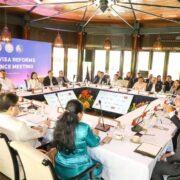Philippines restrategizes skills development for higher value jobs and a brighter sunshine industry
The Philippines is renowned worldwide as one of the biggest English-speaking nations, with majority of its population having at least basic fluency in the language. Spoken by more than 14 million Filipinos, English is also one of the country’s official languages. It is no wonder that for years, the Philippines’ high proficiency in English has become an important advantage, especially to the IT and business process management (IT-BPM) industry, a major driver of the nation’s economic growth.
Back in 2012, the Philippines surpassed India as the top voice outsourcing destination. However, in recent years, studies show that the average score of approximately 10,000 Filipino college students who take the Test of English for International Communication (TOEIC) is 631 out of 990; a score only in the intermediate level or equivalent to the B1 level of the European Framework’s language proficiency. A dilemma arises for the Philippines, because other ASEAN countries are quickly catching up by enacting several policies to improve the English proficiency of their students.
The IT and Business Process Association of the Philippines (IBPAP) is a crucial organization in the IT-BPM industry as it works together with the business sector, academe, and the government to ensure the industry’s continued growth. IBPAP has confirmed that the industry has generated 1.23 million jobs in 2018. A study released in the same year also indicated that the industry is on track to surpass overseas remittance as a primary contributor to the country’s GDP. And as the industry rapidly grows, the need for more manpower is inevitable. But an important factor to take into consideration is the quality of the talent pool available to sustain this development.
“The combination of excellent English proficiency, superior customer services, and technology is what will make the Philippines unstoppable,” Rey Untal, President and CEO of IBPAP, stated. “Cultivating talent has always been one of IBPAP’s priorities in order for the Philippines to continue being one of the top providers of IT-BPM services in the global marketplace. In fact, we have partnered with a number of public and private universities across the nation in previous years to conduct Basic English Skills Training (BEST) and Advanced English Pre-Employment Training (AdEPT) classes. Apart from continued improvement of English skills, we are also focusing our upskilling and reskilling strategies to equip the potential and existing workforce with the digital skillsets and competencies needed to deliver higher value services.”
At the recently concluded International Innovation Summit 2019, IBPAP presented the much-awaited recalibration findings and results of its Roadmap 2022. Untal revealed that by 2022, the Philippine IT-BPM industry is expected to generate revenues around USD 29 Billion to USD 32 Billion while full-time employees will grow to about 1.42 Million to 1.57 Million. The Compound Annual Growth Rate (CAGR) for 2019-2022 is estimated to be at 3.5 percent to 7.5 percent in revenue.
During the presentation, Untal together with research partner Everest Group highlighted the importance of upskilling and reskilling of the workforce by instilling more digital skills and competencies to become better providers of higher value jobs. IBPAP also underscored the continued promotion of the Philippine Talent Upskilling Program to help potential and existing members of the workforce become lifelong learners.
Apart from talent development, the recalibration also covered other action points such as:
- Continued collaboration to strengthen public and private partnerships to ensure sustained government support.
- Development of mentorship opportunities from key tech experts to continuously grow SMEs and startups and startup enablers like incubators, accelerators, and other funding institutions.
- Nurture an ecosystem that promotes infrastructure and countryside development.
- Improve country branding to strengthen the Philippines competitiveness in the global marketplace.
IBPAP remains hopeful that through the 11th International Innovation Summit, conversations and collaborations will continue as the industry charts the Next PHase of IT-BPM, and strengthen the Philippines’ position as one of the top investment destinations in the world for IT-BPM services.





